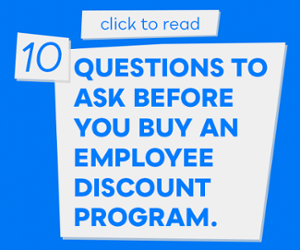Engaged employees are the lifeblood of successful organizations.
It’s proven that engaged employees produce a better product and bottom line. Customers love them, too.
Of course, this isn’t news to HR pros. You’ve known this all along.
Your management may not. Those folks tend to focus on bottom lines and end results.
Human capital? Whatever, just keep people working, and make it as cheap as possible.
This is how organizations wind up settling on designed turnover. They actually build certain positions knowing that employees won’t stay in them long.
Think of the kid who bags your groceries or takes your cash at the fast food joint. To some, it's better to keep them rotating than to pay them another $.50/hour every few months.
It’s all about keeping hard costs low and predictable.
Meanwhile, it’s customers who suffer from having to deal with employees who know they’re on borrowed time and aren’t valued. High turnover often results in increased mistakes and disinterested employees.
But it costs money to keep people, and even more to keep them engaged, right?
That isn’t exactly the case.
Engaged Employee Does Not Equal Expensive Employee
Of course every employee wants to be compensated well. But the cool thing is an employee-centric company is something people want to be a part of. So much so that salary will play a secondary role.
- 36% of employees would give up $5,000 a year in salary to be happier at work (Randstad)
- Just 37% of engaged employees would consider leaving for a 20% raise or less, compared to 54% of actively disengaged employees (Gallup)
- 78% of Millennials say it is more important to enjoy work than to make a lot of money (Clark University)
- 64% of Millennials said they would rather make $40,000 a year at a job they love than $100,000 a year at a job they think is boring (Intelligence Group)
Browse through our employee engagement stats and you'll see even more. Engaged employees stay late off the clock, they recommend friends to apply, and adapt to changes. They're even far less likely to steal or leak private company info.
Will an engaged, long-term employee require increased compensation as time goes on? Of course. But you can make them even more valuable to your organization by giving them new roles and opportunities.
Over the course of their employment, the gap between the value they produce will grow exponentially alongside their compensation. It's the best investment you can make.
In the long run one engaged employee will bring more positive value to an organization than thousands of disinterested, distracted goobers.
Is a Fully Engaged Workforce More Expensive?
You want as many engaged employees as possible, and you want to keep them.
The costs of being comfortable with disengagement is far higher, in terms of dissatisfied customers, turnover, theft, and low morale (disengagement spreads like wild fire).
The answer to this question is another question: how can you afford to not have a bunch of engaged employees on your staff?




